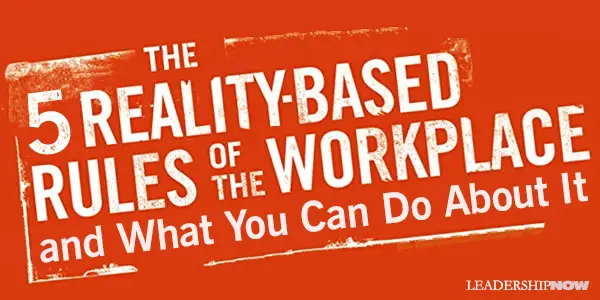 |
 |
07.03.13

The 5 Reality-Based Rules of the Workplace and What You Can Do About It
CY WAKEMAN does an excellent job of helping us to peel away the layers of rationalizations and excuses we create to avoid facing reality. First she did it with Reality-Based Leadership and now with Reality-Based Rules of the Workplace. Too often work seems harder than it should be. We can feel helpless in dealing with the realities of "today's" workplace. That said, every time period seems unparalleled in all of history to those going through it. However, people have always struggled with these issues: doing more with less; reduced hours, benefits, or pay; increased work hours; underappreciated. The problem is, as Wakeman puts it, "no one is born accountable self-reliant, self-mastered, and resilient, yet these are the qualities that count, the ones that will fill you with confidence and afford you the chance to chose your destiny, no matter what your field of endeavor." The trick is learning to see your circumstances differently.Wakeman has put this book together to help you do just that. If you have been playing the victim for a substantial period of time, her ideas will seem impossible, but they are the only thing that will work. I am here to tell you: You are not a cog in a machine — far from it. You have more control than you think. That’s the good news. The bad news is, you and you alone are causing your own suffering. What most of you have lost touch with is that it isn’t your reality that is causing your pain and frustration. It’s the worn-out methods, techniques, and mindsets with which you are approaching your reality. I’m here to tell you that your suffering is optional. I can help you get back on track so you can find bliss in your work again while becoming more valuable to your organization than ever before. She has created some pretty straightforward, brief assessments to determine your current performance and your future potential. Your value, plain and simple is based on "the value you bring to your organization, the market value of your work, and the return on investment that you deliver, both economically and emotionally, now and into the future." You must be clear about the value you bring to your organization. The three factors that make up your value: YOUR VALUE = Current Performance + Future Potential - (3 x Emotional Expensiveness) The chapter on Your Emotional Expensiveness is worth reading twice. It's your drama factor. "It is the single most important factor in the New Value Equation, the one that determines whether our Performance and Potential and anything meaningful to the bottom line, and whether others feel that working with us is worth the effort." Wakeman lists 15 clues to your emotional expensiveness factor. Among them are: You may be Emotionally Expensive if …
Wakeman presents the Five Reality-Based Rules of the Workplace: 1. Your level of accountability determines your level of happiness. Personally accountable people bring their own motivation and engagement to everything they do. Be one of those people, and you will ensure your job security—or that your résumé goes to the top of the stack. 2. Suffering is optional … so ditch the drama. (Wakeman estimates that the average person spends two hours each day in drama—complaining, creating stories, and arguing with reality.) Your circumstances are what they are, but your reaction to them is up to you. Even if you don't share your drama with others, there is no such thing as a throwaway thought. Most thoughts lead in some way to an action—or lack of action….Your thinking manifests itself in a way that affects everyone around you and the way they see you. 3. Buy-in is not optional. To succeed, your buy-in is not optional, and action, not opinion, adds value. The most valuable people say "yes" the most often. If a decision has been made, opinions are no longer welcome. 4. Say “yes” to what’s next. Your success will not be dependent on everything staying the same, but on your readiness for what's next. 5. You will always have extenuating circumstances. Succeed anyway. That which is missing from this situation is something I am not giving. When you find something missing (especially—but not limited to—intangibles, like honesty, generosity, humor, sensitivity, or gratitude) don't dwell on what other people "should" be doing or giving.

Posted by Michael McKinney at 11:22 PM
|
BUILD YOUR KNOWLEDGE
 

How to Do Your Start-Up Right STRAIGHT TALK FOR START-UPS 
Grow Your Leadership Skills NEW AND UPCOMING LEADERSHIP BOOKS 
Leadership Minute BITE-SIZE CONCEPTS YOU CAN CHEW ON 
Classic Leadership Books BOOKS TO READ BEFORE YOU LEAD |